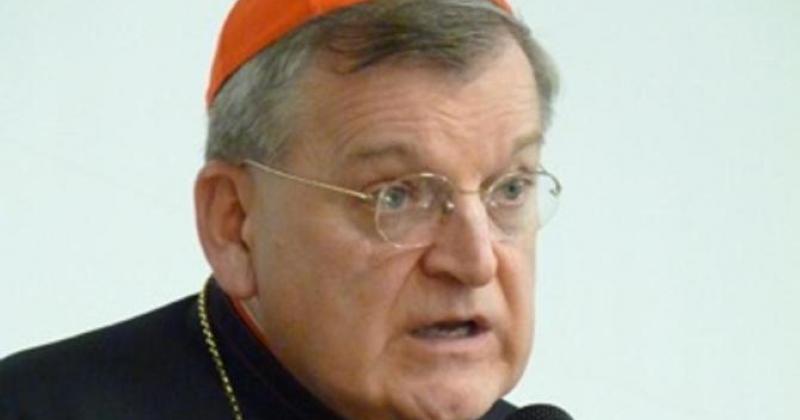Donald Trump was “undoubtedly” preferable to Hillary Clinton due to her stance on abortion while the new president will be well-placed to tackle government corruption, according to Cardinal Raymond Burke.
The cardinal, a leading conservative figure in the United States, said that care for refugees and the poor were important but do not carry the same moral weight as abortion and euthanasia: Trump has said he is pro-life while Clinton supports legal terminations.
Pope Francis, however, has made care for outcasts a central part of his papacy and questioned the president-elect’s Christian faith after he proposed building a wall between the United States and Mexico to prevent migrants crossing the border.
During the 2004 presidential campaign Cardinal Burke, a former Archbishop of St Louis, Missouri, said he would deny communion to John Kerry and other pro-abortion Catholic politicians.
In an interview originally reported in The Tablet the cardinal, now Patron of the Order of Malta and based in Rome, talks about the United States’ election results.
What is Your Eminence’s reaction to Donald Trump’s election?
I am very happy that my fellow Americans have chosen a new President, and given him a strong mandate to address resolutely the corruption that has beset the federal government in recent years. I pray that Our Blessed Lord bestows on President-elect Trump all the graces necessary for him to fulfil this mandate for the true promotion of the Common Good. It is my hope that my homeland will soon be united again, so that we can work for the good of all.
Was President-elect Trump a preferable candidate to Secretary Clinton given her support for late term abortion?
Undoubtedly, yes.
President-elect Trump holds positions that would be harmful to migrants and other vulnerable groups and has been accused of committing indecent acts against women. But he said he was pro-life on the abortion question. Is a political candidate who is anti-abortion preferable even if he holds policies contrary to other elements of Catholic teaching and has been accused of indecent behaviour?
Firstly, to be accused of something is not the same thing as to be guilty of it. Secondly, abortion is the systematic murder of human beings at their most vulnerable stage of development — we need to remember that. Thirdly, we do need to draw a distinction between a migrant and a refugee. How many economical migrants a country accepts is a prudential matter, about which people in good faith are free to disagree. One’s heart must always be open to the genuine refugee, fleeing death, terror and persecution however.
In your given example, I do not see any moral equivalence between abortion, and the welfare of migrants. I hope it is obvious that I think migrants, made in the image and likeness of God like you and me, should be treated with every care and respect. But to put the two issues on the same plane is simply wrong (as the Church clearly teaches).
Does a candidate’s abortion position weigh more heavily than his/her position on migration or helping the poor?
I think the most cogent response to this question remains that of the then Cardinal Ratzinger to the-then President of the USCCB in 2004:
Not all moral issues have the same moral weight as abortion and euthanasia. For example, if a Catholic were to be at odds with the Holy Father on the application of capital punishment or on the decision to wage war, he would not for that reason be considered unworthy to present himself to receive Holy Communion. While the Church exhorts civil authorities to seek peace, not war, and to exercise discretion and mercy in imposing punishment on criminals, it may still be permissible to take up arms to repel an aggressor or to have recourse to capital punishment. There may be a legitimate diversity of opinion even among Catholics about waging war and applying the death penalty, but not however with regard to abortion and euthanasia.
